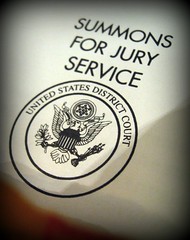Juries and scientific expertise
By Kristopher A. Nelson
in
August 2010
600 words / 3 min.
Tweet
Share
In the American system (and, perhaps to a lesser extent, in all countries following the Anglo-American legal approach), science and scientific evidence emerges and is interpreted through the actions of the parties involved. Expert witnesses testify for a particular side, and are employed by a particular side.
Please note that this post is from 2010. Evaluate with care and in light of later events.
 The United States legal system–at least, the judicial process in the courtroom, whether those be civil or criminal trials–is based fundamentally on the notion that an adversarial process is the best one for arriving at the truth of the matter. That is, each side presents their case in their own way, and after their back-and-forth arguments, a neutral jury determines which side is closer to correct. Perhaps more accurately stated, one side presents its case, while the other side attempts to show it hasn’t been proved–but fundamentally, it’s an oppositional process.
The United States legal system–at least, the judicial process in the courtroom, whether those be civil or criminal trials–is based fundamentally on the notion that an adversarial process is the best one for arriving at the truth of the matter. That is, each side presents their case in their own way, and after their back-and-forth arguments, a neutral jury determines which side is closer to correct. Perhaps more accurately stated, one side presents its case, while the other side attempts to show it hasn’t been proved–but fundamentally, it’s an oppositional process.
The main idea is that each side should take charge of their own fate, in a kind of courtroom analog to capitalism and free-market individualism, and that this self-determination is the best way to produce fairness and truth. The judge serves merely as the umpire ensuring each side follows the rules, which themselves are designed to create a level playing field between the parties. The jury must decide whose facts to believe.
This presents problems when the facts at issue are steeped in scientific dispute. In the American system (and, perhaps to a lesser extent, in all countries following the Anglo-American legal approach), science and scientific evidence emerges and is interpreted through the actions of the parties involved. Expert witnesses testify for a particular side, and are employed by a particular side.
This also presents some problems for scientific experts, who have historically grounded themselves in disinterestedness and objectivity. How does one keep out the influence of one’s employer, either out of self-interestedness or just a lack of access to anything but what one’s own side provides?
While the U.S. judicial system has developed a number of methods to deal with these problems–from various rules of evidence, to standards for judging scientific evidence from Frye to Daubert–there are still problems for scientific expertise in the courtroom. As just one example, how do you enforce rules against perjury if an expert is testifying to a theory? How are lay juries–consisting of specifically of people unfamiliar with the evidence, the case, and the facts–supposed to evaluate and decide between competing scientific claims?
Scientists and others have come up with a number of suggestions, but all of them have involved too many changes to the process for lawyers and judges to agree on implementing them. Appointing experts as direct advisors to the court, for example, interferes with traditional ideas of the judge as a neutral umpire, merely refereeing each side’s zealous advocacy. (Contrast this with European methods, which place approved experts in direct service to the judge, who, incidentally, often gathers evidence as well as overseeing the trial.) Putting scientists into the jury isn’t too popular with lawyers either–typically, special knowledge disqualifies you instead, because lawyers don’t want jurors with preconceived knowledge or ideas.
But at the very least, why not allow experts–jurors who are “people having ordinary skill in the art”–in the jury on patent trials? Or how about eliminating juries for patent trials entirely? (England, our common-law mother, did this already.) But the Constitution can make such distinctions between types of cases problematic, and in any case, lawyers and judges are invested in the current system. Questioning its fairness in one kind of case might lead to questioning it in other situations.
So what to do? How can juries possibly decide between equally compelling and apparently valid scientific theories? Do we need to change the system? Or can lay juries do just fine, despite the scientific complexities of many cases?
Related articles by Zemanta
- The Daubert Standard (socyberty.com)
- SFgate.com Chevron: Outtakes prove collusion with expert (sfgate.com)
